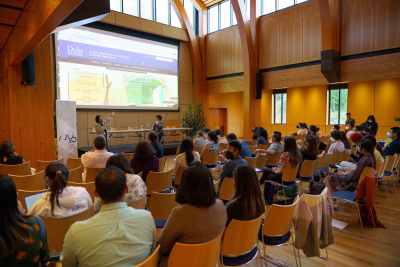
The Friends We Made Along the Way: Interview of Graduating AADS and AASWG Student, David Lee
David Lee (T ‘23) has been involved in student organizing for Asian American Studies since they were a freshman, in spaces where maybe “the real Asian American studies are the friends we made along the way.” In AASWG (the Asian American Studies Working Group), he found not only much-lauded base of student investment in Asian American Studies, but also a kind of “political home” rare at Duke. Over the last 20 years, AASWG and its predecessors have been mobilizing for the establishment of an Asian American Studies department at Duke – five years ago, their demands became reality with the establishment of a program, and this year, David will become one of the first students to earn the minor.
By his freshman year, AADS already existed, but David still noted how far AADS has come even just in the last four years. “The establishment of the minor made it easier to take [AADS] classes and be in community with the people you meet,” he commented, and new faculty hires and the expansion of AADS classes were both an integral part of that growth. Now, after a series of Keohane Distinguished Lectures in Asian American Studies and with a new senior faculty hire on the horizon, it’s clear that the role that AADS plays in the university is growing. As AADS becomes more scaffolded within the institution, though, it also inevitably faces different pressures than before.
Spaces like AASWG have historically functioned not only to organize energy towards the institutionalization of Asian American Studies, but also in critical recognition of the limitations of university systems like Duke’s. The opportunities that AADS provides to learn with “amazing professors and people” are invaluable, David noted, but are ultimately limited to certain kinds of knowledge. AASWG creates spaces for students to process all of the traumas inflicted by Duke and the world, and in its intentional separation from the university, resists reproducing the “isolation created by a university that pushes neoliberal self-care and academic productivity at the same time.” Asian American Studies, in short, “goes beyond what you can learn in a classroom,” a hope for the unknown which has shaped AASWG in the last five years.
In the immediate future, David hopes that AADS will continue growing with students at its core. The road to a major might be kind of long, he acknowledged. In the meantime, though, more faculty hires, support for junior faculty, and a wider range of AADS classes will continue to carve out space both for students and for a more dynamic vision of Asian American Studies moving forward.